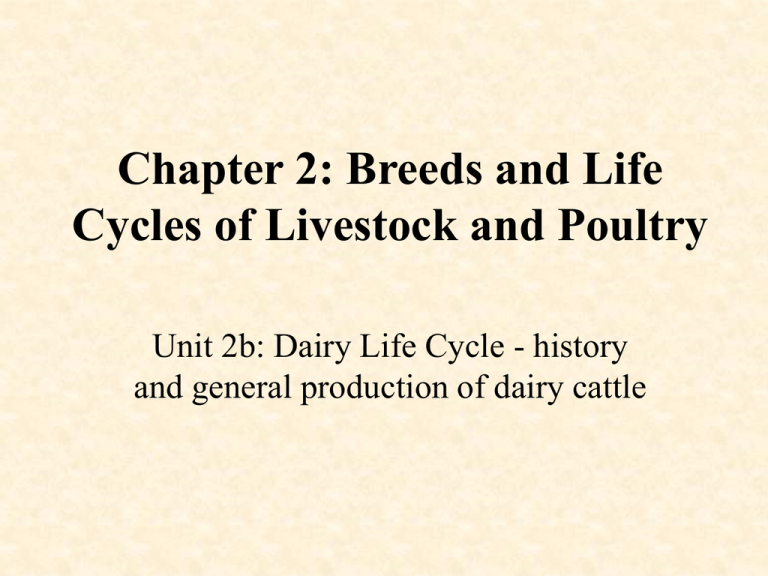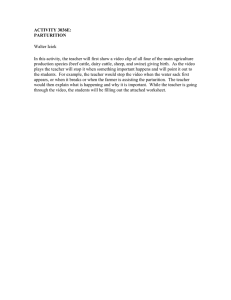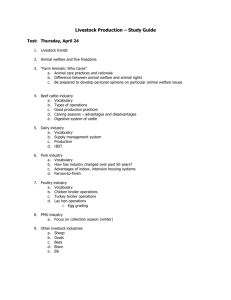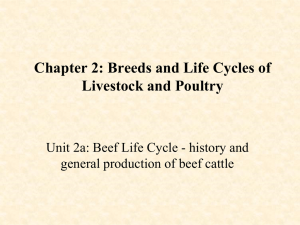Chapter 2: Breeds and Life Cycles of Livestock and Poultry
advertisement

Chapter 2: Breeds and Life Cycles of Livestock and Poultry Unit 2b: Dairy Life Cycle - history and general production of dairy cattle Dairy Cattle in the Americas: • 1607: Virginia colony, all eaten • 1611: Jamestown colony, survival! • 1625: Dutch colonies; herds began Dairy Cattle Genealogy: • Genus: Bos • Species: taurus(typicus) – Common term: bovine – All 6 major US breeds come from European stock Historical Perspectives: • Early American dairy cattle were dual and triple purpose – Milk – Meat – Draft labor • Dairy herds developed around population centers for ease of delivery of fresh product Dairy Cattle Numbers, 2000 State: California Number of farms: 2,500 Number of dairy cows: 1,523,000 Production per cow: 21,169 Wisconsin 21,000 1,344,000 17,306 New York 7,900 686,000 17,386 Pennsylvania 10,700 617,000 18,081 Minnesota 8,500 534,000 17,777 US Total: 105,250 9,210,000 18,204 Dairy Life Cycle: Calving • Year-round calving is most common in the US to promote a steady flow of milk for sale • Some seasonal calving utilized to reduce milking and calving in the coldest months or to support grazingbased systems • Gestation in cattle is about 9 months Newborn Calf Management: • Birth weight: 60-100 pounds • Colostrum feeding - hand feeding compared to beef nursing • Weaning from dam - within first day as compared to 7 months for beef • Navel dipping - antiseptic solution • Identification - begin record keeping Colostrum Feeding: • The first milk produced by the cow around the time of calving • Concentrated in preformed antibodies • Provides passive immunity to the calf • Should be received within an hour of birth • Colostrum often bottle fed to assure consumption Other Contrasts to Beef: • After colostrum, calves are fed reconstituted milk-replacer and weaned from milk at approximately one month of age • Calves are raised in hutches or specialized calf facilities Calf Management: First Month • Horn removal - if not genetically polled • Males are generally sold at one day of age to specialty growers for beef production • Castrate - bull calves for beef will be castrated in the first week to month of age Female Replacements: • Goal 1: first calf by 2 years of age – Selected females will be bred at about 15 months of age • Goal 2: 12 month calving intervals – Rebred by 90 days post-calving – Full maturity reached at about 5-6 years 12 Month Production Cycle: • Lactation is initiated by calving • Standard lactation period: 10 months – Peak production reached at 45 days • Dry period: 2 months – Cessation of production and rebuilding of body stores and mammary gland • Lactation is reinitiated by calving Dairy Bulls: • Compared to beef: – – – – Pre-selected via planned matings Very few bull calves selected AI organizations (“bull studs”) predominate Feedlot performance not tested (USA)



